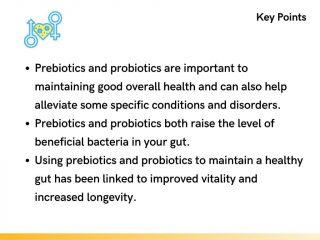
Pre and probiotics are key to maintaining a balanced gut and overall good health.
Your gut is home to hundreds of thousands of different microflora – some “good” and some “bad,” collectively known as the “gut microbiome.” Keeping them in proper balance can be critical to proper digestion, combating systemic inflammation and maintaining overall good health. This is where prebiotics and probiotics come into play, as they can help you to keep your gut in balance.
Almost all gastrointestinal problems stem from having an imbalance of “good” gut bacteria to “bad” gut bacteria. Today, there is increasing medical evidence that a disproportionate number of bad gut bacteria and good can cause a variety of other problems beyond merely belly concerns. Prebiotics and probiotics, whether in foods or taken as supplements, both can raise your level of good bacteria in the gut, although they do so in two quite different ways.
Probiotics are actually live cultures of “good” gut microflora, so taking them increases their population in your gut. Prebiotics are what the good bacteria feed on, so taking prebiotics helps keep the good bacteria already in your gut healthy and alive.
Understanding Pre and Probiotics
As medical science has become more and more aware of the role that the gut microbiome plays in overall well-being, gut health has been all over the news lately. This is why you have probably heard about prebiotics and probiotics. But you may not really know what they are, what the differences between the two are, and why they are so important to health and longevity.
Millions, even trillions, of microorganisms live in your gut or digestive system. If that sounds gross, it’s not; all these tiny bugs play a vital role not only in digestion but in maintaining a healthy weight, immune function, brain health, and more. But for your gut to function at its peak performance, there has to be the right balance of good bacteria to bad bacteria.
Prebiotics and probiotics are used to improve gut health and overall health by increasing the level of good bacteria in your gut.
Prebiotics vs. Probiotics: Key Distinctions

Prebiotics and probiotics may sound similar, and they both have the same purpose of increasing the volume of good bacteria in your gut. However, they are two very different things.
Definition of Prebiotics
Prebiotics are the food upon which your good gut bacteria feed. They are found either in specific fiber supplements or in high-fiber foods.
Definition of Probiotics
Probiotics are actual live beneficial bacteria or cultures that are found in specific supplements or “fermented” foods like yogurt and sauerkraut.
Key Differences
Both probiotics and probiotics can be taken as nutritional supplements. Besides what they actually are and what they do, the other key difference is the foods they can be found in. Prebiotics can be obtained through diet by increasing your consumption of high-fiber foods like whole grains, fruits and vegetables, onions, garlic, lentils, and soybeans. Live probiotics are found in fermented foods like yogurt, kefir, kimchi and sauerkraut.
Why Pre and Probiotics Matter
Pre and probiotics matter because there is an increasing body of evidence that keeping a healthy proportion of good bacteria to bad in the gut microbiome can be critical to well-being and vitality. A recent study even found that probiotics can help prevent colon cancer. There have been other studies that link good gut health to a better immune response and how prebiotics and probiotics could improve emotional health.
Health Benefits of Pre and Probiotics
Prebiotics and probiotics each play their own particular role in improving gut balance and your overall health. Almost any digestive issue you can think of, from chronic diarrhea to gas, bloating, or constipation, stems directly from not having the right level of good bacteria in your digestive tract. But digestive issues are not the only health benefits of pre and probiotics.
Digestive Health
The primary role of the beneficial bacteria in your gut microbiome is digesting your food, drawing proper nutrients from it, and helping you to get rid of waste efficiently when that process is done. But the good bacteria are also there to keep harmful bacteria in check that can cause all sorts of gastrointestinal issues. From common tummy problems like gas, indigestion, constipation, and nausea to more serious gastrointestinal diseases like Crohn’s disease and irritable bowel syndrome, your digestive health is intricately linked to the gut microbiome and your intake of pre and probiotics.
Immune System Support
There has been an increasing body of evidence to indicate how increasing the level of good bacteria with prebiotics and probiotics helps to support a healthy immune system. In addition to aiding in digestion, another important role of good gut bacteria is they form a barrier, a kind of protective shield between the lining of the gut and the body, keeping toxins and pathogens from causing infections, inflammation, and illness throughout the body. Beyond that, the primary “foot soldiers” of your immune system are specialized cells known as cytokines. Studies have found that prebiotics and probiotics have a positive effect on producing cytokines and keeping them strong and healthy.
Balancing Gut Microbiota

Balancing the gut microbiota can improve health, aid in digestion, help you maintain a healthy weight, and may even help you to live longer! A 2021 study found that one thing that centenarians (people 100 years old or more) had in common is a healthy, balanced gut!
Tailoring Pre and Probiotics to Gender
Prebiotics and probiotics are not necessarily “gender specific,” but there are certain strains of probiotics that can help with some specific issues relating to women, such as vaginal infections.
Pre and Probiotics for Men
Generally speaking, men and women can obtain the same overall health benefits from prebiotics and probiotics. However, because of the relative differences in the makeup of their digestive tracts, men and women are prone to different types of gastric distress, which could influence which pre and probiotics to take. Men have shorter bowels than women, so they tend to suffer from distress of the upper digestive system, such as indigestion, GERD, and ulcers. Lactobacillus acidophilus and Bifidobacterium strains have been shown to be the most effective probiotics for preventing acid reflux and heartburn. These particular probiotics are found in fermented foods, yogurt, and probiotic supplements.
Pre and Probiotics for Women
While men can benefit from almost any type of prebiotic or probiotic supplement, certain strains have been researched specifically for the support of female health issues such as vaginal infections and pregnancy. For example, A 2018 clinical trial found that the specific probiotic strain Lactobacillus rhamnosus can help reduce symptoms of bacterial vaginosis, such as itching and discharge.
Selecting the Right Pre and Probiotics – Factors to Consider
Before starting any regimen of pre-and probiotics, there are several factors to consider to make sure you are taking the best ones for your particular needs. First up, when it comes to probiotics, you want supplements or foods with “live, living cultures.” And since these are living things, you must store your probiotics in the refrigerator to keep them alive and healthy. But prebiotics are not living things; they are just forms of soluble fiber, which means they can be stored anywhere.
Most importantly, the main goal of taking prebiotics or probiotics is to increase your good gut bacteria. But there are several different strains of those little guys living down there. You may want to speak with your doctor or healthcare professional to discuss your specific symptoms or desires. He or she may be able to recommend specific streams for your particular wants.
Weighing the Pros and Cons
By now, you have probably come to see how prebiotics and probiotics are good for you. But like anything, they do have some cons as well as pros.
Pros of Pre and Probiotics

As we have mentioned, there are numerous pros of taking prebiotics and probiotics. The bottom line, you need pre-and probiotics for healthy digestion, maintaining a healthy immune system, and so much more.
Cons and Potential Side Effects
However, all this is not to say that there are no side effects or potential negative impacts of prebiotics and probiotics. Probiotics, and particularly some probiotic foods, like sauerkraut, can cause allergic reactions in some people. They can also cause diarrhea or other stomach problems in some folks, and they could be problematic for people with any kind of immune system issues. If you think you have any such issues, consult your healthcare provider before increasing your intake of pre- or probiotics.
Reasons to Incorporate Pre and Probiotics
For the most part, the benefits of prebiotics and probiotics outweigh their possible issues for most people. There are good reasons to incorporate them into your daily routines for both overall health improvement and also to alleviate some specific health concerns.
Overall Health Improvement
For overall health improvement, increasing your good bacteria with prebiotics and probiotics can:
- Improve your digestion.
- Improve your immune health.
- Improve cognition and mood.
- Help you maintain a healthy weight.
- Prevent certain types of cancer.
Addressing Specific Health Concerns
More specifically, prebiotics and probiotics have been studied and found to have a beneficial effect on specific conditions such as:
- Gastrointestinal disorders such as GERD, irritable bowel syndrome, and Crohn’s disease.
- Yeast infections and urinary tract infections.
- Skin conditions such as eczema
- Chronic respiratory infections
- Systemic inflammation, such as from rheumatoid arthritis
Pre and Probiotics: Who Should Avoid Them
Prebiotics and probiotics are generally regarded as healthy and safe, but there are some people who may want to avoid them or speak to their doctors before using them.
Allergies and Sensitivities
If you have a known sensitivity to fiber, like if high-fiber foods tend to cause you gas or diarrhea, you may want to avoid certain probiotics. If you have a known food allergy to certain foods like sauerkraut, then you may need to speak to your doctor about what strains of probiotics you can take and the ones to avoid.
Medical Conditions
Probiotics and prebiotics are generally considered safe. However, there are some risks to taking them if you have any kind of medical condition that weakens your immune system or, if you have recently had surgery, or have other serious medical conditions.
Take Charge of Your Gut Health
Taking charge of your gut health has been proven to improve your over health and may even aid years to your life. Take the first steps to a healthy gut by speaking to your doctor or healthcare professional about prebiotics and probiotics.

